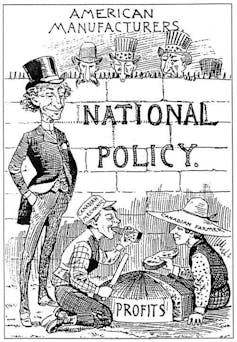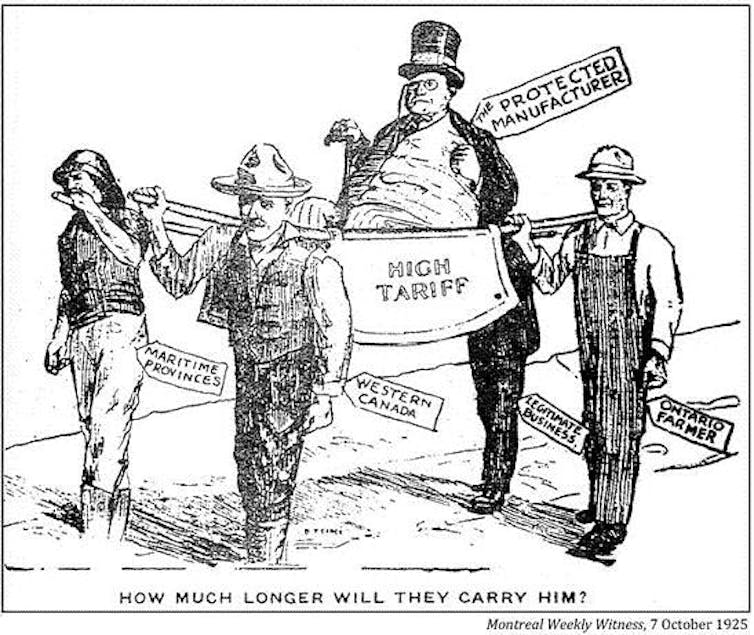'Trade wars are good'? 3 past conflicts tell a very different story
- Written by Marc-William Palen, Lecturer in History, University of Exeter
President Donald Trump renewed fears of a global trade war after he vowed[1] to slap steep tariffs on foreign aluminum and steel.
The tariffs haven’t even been formally proposed, yet other countries are already threatening countermeasures. The European Union, for example, promised to impose [2] tariffs on iconic American products like Harley-Davidsons, Kentucky bourbon and blue jeans, while China, Australia and Canada all promised a response[3].
Brushing all that aside, the president tweeted that “trade wars are good.”
But what exactly is a trade war and what are its consequences?
As a historian of trade[4], I thought it would be worth recalling some illuminating examples, each of which led to disastrous results.
France and Italy go to ‘war’
Soon after Italy’s unification in 1871, the young nation turned to protectionism to foster its “infant” industries, whereupon it terminated its trade agreement with France in 1886.
Italy raised tariffs as high as 60 percent to protect its industries from French competition. The French government responded by refusing to negotiate and instead threatened the Italians with punitive tariffs if Italy did not lower its own.
Tariff retaliation followed tariff retaliation. In France, this resulted in the passage[5] of the highly protectionist Méline Tariff[6] of 1892, which famously signaled the death knell of the country’s flirtation with free trade.
Both nations felt the costs[7] of the trade war, but the damage extended more widely. Franco-Italian trade fell drastically, followed by dislocations in countries where they got supplies.
Another unintended result was that it pushed Italy closer to Germany and Austria-Hungary in the years leading up to the First World War.
The GOP takes on the Canadians
Although the GOP has in recent times called itself[8] the “party of free trade” – before Trump anyway – it wasn’t always thus. In the years following the U.S. Civil War, for example, when Republicans dominated the presidency, it was the proud party of protectionism[9] and took efforts to solidify its economic nationalist platform.
 This 1891 Canadian cartoon suggests a policy of tariff retaliation against the U.S. aiding Canadian agriculture and industry.
The Industrial League for Free Distribution
This 1891 Canadian cartoon suggests a policy of tariff retaliation against the U.S. aiding Canadian agriculture and industry.
The Industrial League for Free Distribution
The U.S. abrogated its reciprocity treaty with Canada in 1866, following which Canadian economic nationalists sought to pay their southern neighbor back “in their own coin[10]” – that is, through tariff retaliation.
By 1879, Canadian Conservatives consolidated around their own national policy of protectionism. Some American companies – Singer Manufacturing, American Tobacco, Westinghouse and International Harvester – decided to move their production to Canada[11] rather than pay the high import taxes. By the late 1880s, 65 U.S. manufacturing plants had relocated to Canada. In this case, far from halting outsourcing, protectionism caused it.
Trade tensions reached a breaking point in 1890. Republicans, in charge of the executive and the legislative branches, passed the highly protectionist McKinley Tariff. Agricultural exports to Canada fell by half from 1889 to 1892.
And when the Republicans passed the even more protectionist Dingley Tariff in 1897, Canada decided[12] that the best response was a double dose of tariff retaliation and closer trade ties with the British empire rather than the United States.
It thereafter took nearly a century for free trade between the U.S. and Canada to develop.
 The fight between free traders and protectionists has been going on for a long time.
Montreal Weekly Witness
The fight between free traders and protectionists has been going on for a long time.
Montreal Weekly Witness
Smoot-Hawley wars and the age of protectionism
Trade wars were by no means unique to the late 19th century. Far from it.
The trade wars that followed the Republican passage of the protectionist Smoot-Hawley Tariff Act of 1930[13], which raised duties on hundreds of imports[14], similarly contain illustrative lessons for today[15]. Canada responded with tariff increases of its own, for example, as did Europe.
In a widely cited study[16] from 1934, political economist Joseph M. Jones Jr. explored Europe’s retaliation. His study provided a warning about the trade wars that can arise when a single nation’s tariff policy “threatens with ruin” specialized industries in other countries, arousing “bitterness” throughout their populations.
To provide but one example from Jones’ study, the Italian public responded violently to the Smoot-Hawley Tariff. American-made cars were attacked and befouled on the streets of Italy. And in June 1930, Benito Mussolini vowed that “Italy will defend herself in her own way.” Tariff duties were increased on U.S. goods, and total U.S. exports to Italy plunged from US$211 million in 1928 to $58 million in 1932.
An indignant Italy added insult to injury by signing a commercial treaty with Soviet Russia in August 1930, followed by a nonaggression pact two years later.
More broadly, economist Douglas Irwin notes[17] how the 1930 tariff “was very damaging from the standpoint of U.S. commerce” because it sparked tit-for-tat trade discrimination against the U.S. and “diverted existing trade away.”
Economist and New York Times columnist Paul Krugman has similarly reminded[18] us that, although the Smoot-Hawley Tariff did not cause the Great Depression, the resulting international trade wars played a critical part “in preventing a recovery in trade when production recovered.”
This is an updated version of an article originally published on March 22, 2016.
References
- ^ he vowed (www.nytimes.com)
- ^ promised to impose (www.nytimes.com)
- ^ all promised a response (www.nytimes.com)
- ^ historian of trade (www.cambridge.org)
- ^ passage (journals.cambridge.org)
- ^ Méline Tariff (en.wikipedia.org)
- ^ felt the costs (books.google.co.uk)
- ^ called itself (www.denverpost.com)
- ^ party of protectionism (theconversation.com)
- ^ in their own coin (www.academia.edu)
- ^ decided to move their production to Canada (www.historyandpolicy.org)
- ^ decided (books.google.co.uk)
- ^ Smoot-Hawley Tariff Act of 1930 (www.investopedia.com)
- ^ raised duties on hundreds of imports (www.economist.com)
- ^ lessons for today (books.google.co.uk)
- ^ study (www.upenn.edu)
- ^ notes (books.google.co.uk)
- ^ reminded (krugman.blogs.nytimes.com)
Authors: Marc-William Palen, Lecturer in History, University of Exeter
Read more http://theconversation.com/trade-wars-are-good-3-past-conflicts-tell-a-very-different-story-92801

